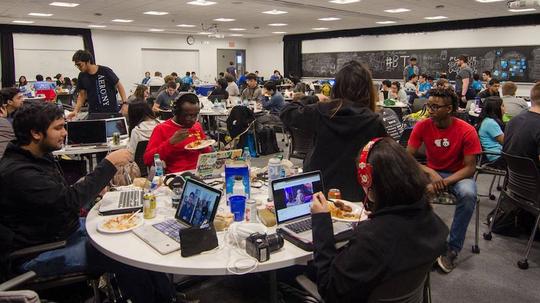
HackIllinois, a student-run hackathon hosted by University of Illinois Urbana-Champaign, is heading into its fourth year this February. The event brings together students from around the country to work on coding challenges, learn new skills and connect with tech companies, at a school known for its coding prowess. It's one of the premier events in the Midwest, organizers say: Last year they had over 1,500 attendees.
But this year UIUC students are trying something a little different, and unique among collegiate hackathons--they're challenging participants to create open source projects.
"Open source is a foundation that is built on collaborative software creation," said Andrew Kuznetsov, a junior studying computer science at UIUC and one of the HackIllinois organizers. "It’s daunting to many people because there’s a level of logistical complexity in coding an open source project because of the collaborative nature."
A lot of people in college want to give back to open source.
"A lot of people in college want to give back to open source. They realize it is valuable for their resume and to give back," he added. "But they’ve never done it, and the reason they’ve never done it is because [no one] ever sat down and said, it’s not that bad."
He pointed out that there is a unique workflow to projects, which can sometimes amass hundreds and thousands of contributors. Students often aren't sure where to start or how to push changes, and have a fear of making mistakes when so many people are reviewing code, Kuznetsov said. But open source projects have produced integral technology--Mozilla Firefox and Linux were both built in part by thousands of volunteers taking their own time to build software.
HackIllinois, which will run February 24th to 26th, 2017, will have two tracks: A track where students can create open source projects, such as an audio player or web browser, designed that the projects could continue to function as collaborative open source projects even when the hackathon is complete, and a track where students can learn how to contribute to an open source project, with a mentor guiding the way.
It's a far more collaborative approach to the collegiate hackathon (which Kuznetsov said usually involves "consuming massive amounts of caffeine to eke out a bit of code.") They're planning on retooling the prize system to avoid pitfalls of other hackathons, such as gearing a project to a sponsor's prizes. The main goal will be to create sustainable projects that students can continue to work on once the hackathon is complete.
HackIllinois organizers are currently recruiting both mentors (to help student learn how to contribute and build on open source) and students to participate in the hackathon. Interested mentors can email organizers (contact@hackillinois.org), and interested students can keep their eye on the HackIllinois Facebook and Twitter for information on signing up (applications should open by early January). The event is free to attend.








